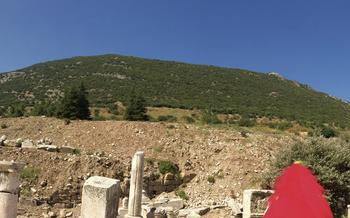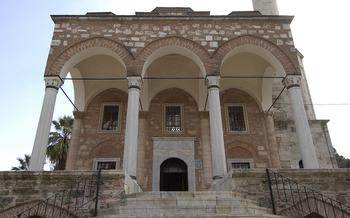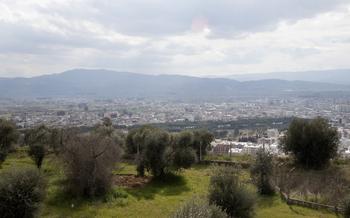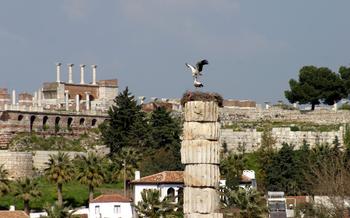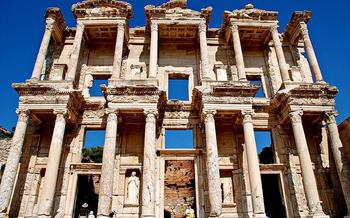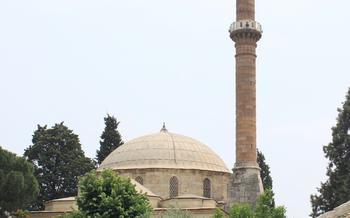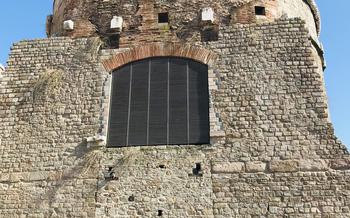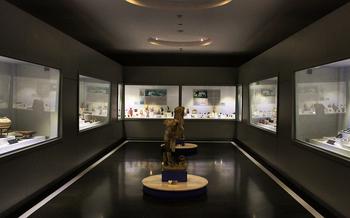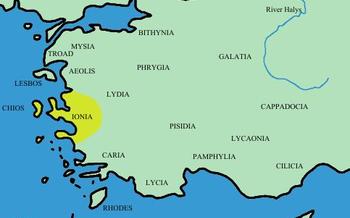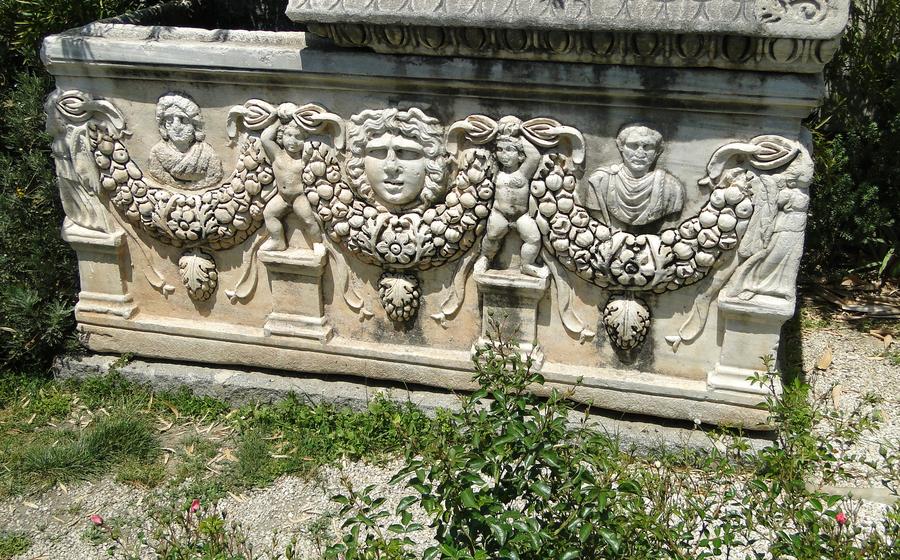
Selçuk Ephesus Museum
- Historical Significance:
- Ephesus Museum: A Treasure Trove of Ancient Artifacts
- Ephesus Model
- Interactive Displays:
- Temporary Exhibitions:
- Theology and Religion
- Architecture and Urban Planning:
- Daily Life:
- Archaeological Discoveries
- Photography and Social Media
- Educational Programs
- Souvenirs and Gifts
Historical Significance:
Explore the storied history of Ephesus, a city that flourished as a major center of the Roman Empire. Delve into its rich past as a prominent port city, a hub of trade and commerce, and a significant religious center. Discover the role Ephesus played in the spread of Christianity and its connection to Saint John and the Virgin Mary. Witness the ongoing archaeological excavations that continue to unveil the secrets of this ancient civilization, shedding light on the grandeur and complexity of bygone eras.
Ephesus Museum: A Treasure Trove of Ancient Artifacts
The Selçuk Ephesus Museum stands as a testament to the rich history and cultural heritage of the ancient city of Ephesus. Established in 1976, the museum proudly houses an extensive collection of artifacts excavated from the ruins of Ephesus, offering visitors a glimpse into the grandeur and artistry of this once-thriving metropolis.
The museum's impressive collection encompasses a vast array of sculptures, inscriptions, coins, and everyday objects, each telling a unique story of life in ancient Ephesus. Among the highlights are the iconic Artemis of Ephesus statue, a magnificent representation of the city's patron goddess; the intricate frescoes from the Terrace Houses, showcasing glimpses of domestic life; and the awe-inspiring façade of the Celsus Library, a testament to the city's intellectual pursuits.
Beyond its captivating exhibits, the Selçuk Ephesus Museum plays a crucial role in preserving and showcasing the cultural heritage of Ephesus. Through its dedicated curatorial efforts, the museum ensures that these precious artifacts are meticulously documented, conserved, and presented to the public in a manner that both educates and inspires.
With its wealth of archaeological treasures, the Selçuk Ephesus Museum stands as a must-visit destination for anyone seeking to delve into the fascinating world of ancient Ephesus. Its collection provides a tangible link to the past, allowing visitors to experience the grandeur and artistry of this remarkable city that once stood at the crossroads of civilizations.
Ephesus Model
The Selçuk Ephesus Museum houses an impressive large-scale model of the ancient city of Ephesus, providing visitors with a comprehensive understanding of its layout, architecture, and daily life. Carefully crafted based on archaeological findings and historical research, the model allows visitors to visualize the grandeur and complexity of this once-thriving metropolis.
The model is not merely a static display but an interactive experience that brings the ancient world to life. Lighting and sound effects recreate the bustling atmosphere of the city, transporting visitors back in time to witness the vibrant streets, bustling markets, and grand religious ceremonies. The intricate details of the model showcase the architectural wonders of Ephesus, including the iconic Library of Celsus, the Great Theater, and the Temple of Artemis.
Through this immersive experience, visitors gain a deeper appreciation for the urban planning and engineering marvels of the ancient Ephesians. The model highlights the city's well-organized grid-like street layout, its sophisticated water supply system, and its impressive public buildings. It serves as a testament to the ingenuity and innovation of the ancient Ephesians, whose legacy continues to inspire modern-day urban design and architecture.
Interactive Displays:
The Selçuk Ephesus Museum offers an array of interactive displays and multimedia presentations that bring the ancient world to life for visitors of all ages. Touchscreens, virtual reality, and augmented reality technologies are employed to create immersive experiences that allow visitors to explore different aspects of Ephesus's history and culture. Through these interactive exhibits, visitors can virtually walk through the ancient city, examine artifacts in 3D, and learn about the daily lives and customs of the Ephesians. These displays not only enhance the visitor experience but also serve as valuable educational tools, providing deeper insights into the rich history and heritage of Ephesus.
Temporary Exhibitions:
The Selçuk Ephesus Museum hosts temporary exhibitions throughout the year, which provide visitors with a unique opportunity to explore specific themes or collections related to Ephesus and the surrounding region. These exhibitions showcase new discoveries, research findings, and rare artifacts that are not usually on display in the permanent collection.
Past temporary exhibitions have covered a wide range of topics, such as the history of coinage in Ephesus, the daily life of the ancient Ephesians, and the role of women in Ephesian society. These exhibitions offer visitors a deeper insight into the rich history and culture of Ephesus and allow them to learn about the latest developments in archaeological research.
Temporary exhibitions also provide a platform for emerging artists and scholars to showcase their work and contribute to the ongoing dialogue about Ephesus. By presenting new perspectives and interpretations, these exhibitions challenge traditional narratives and encourage visitors to think critically about the ancient world.
Whether you are a history buff, an archaeology enthusiast, or simply looking for a unique cultural experience, the temporary exhibitions at the Selçuk Ephesus Museum are not to be missed. Check the museum's website or social media pages for upcoming exhibitions and plan your visit accordingly.
Theology and Religion
Ephesus was not only a thriving commercial center but also a significant religious hub in antiquity. The city was home to the renowned Temple of Artemis, one of the Seven Wonders of the Ancient World. Dedicated to the Greek goddess Artemis, the temple was a magnificent structure that drew pilgrims from across the Mediterranean. Its grandeur and opulence reflected the deep devotion of the Ephesians to their patron deity.
With the rise of Christianity, Ephesus played a pivotal role in the spread of the new faith. The city was home to one of the Seven Churches of Asia mentioned in the Book of Revelation, and it is believed that the Apostle Paul spent several years in Ephesus, preaching and establishing a vibrant Christian community. The presence of numerous early Christian churches and monuments, including the Church of Mary, further attests to the city's significance as a center of early Christianity.
Beyond the cult of Artemis and Christianity, Ephesus was also a melting pot of various religious beliefs and practices. Archaeological evidence suggests that the city was home to a diverse population, each with their own religious traditions. Temples dedicated to Egyptian, Persian, and Roman deities have been unearthed, reflecting the cosmopolitan nature of Ephesus and its role as a crossroads of cultures and religions.
Architecture and Urban Planning:
Ephesus stands as a testament to the architectural prowess of the ancient world. Its well-preserved public buildings, theaters, and bathhouses showcase the city's grandeur and sophistication. The Library of Celsus, with its imposing façade and intricately carved columns, is a masterpiece of architectural design. The Great Theater, capable of accommodating over 25,000 spectators, is an awe-inspiring testament to the city's cultural and entertainment prowess. The Ephesus aqueduct system, a marvel of engineering, brought fresh water to the city from distant mountain springs, demonstrating the advanced infrastructure of ancient Ephesus. The grid-like street layout, still visible today, reflects the city's organized urban planning and reflects the influence of Roman urban design principles. Ephesus' architectural heritage continues to inspire and captivate visitors, offering a glimpse into the ingenuity and creativity of its ancient builders.
Daily Life:
Step into the vibrant world of ancient Ephesus and discover the intricate tapestry of daily life that unfolded within its walls. Unearth the secrets of the Ephesians' occupations, from skilled artisans and merchants to religious figures and government officials. Explore the bustling marketplaces, where exotic goods from distant lands were traded, and the workshops, where craftsmen poured their hearts into creating exquisite pottery, textiles, and jewelry.
Imagine the lively atmosphere of the city's streets, filled with the sounds of laughter, chatter, and the clatter of carts. Attend a performance at the magnificent Great Theater, where actors brought myths and legends to life on stage. Relax in the soothing waters of the city's bathhouses, where locals gathered to socialize, cleanse their bodies, and rejuvenate their spirits.
Peer into the domestic life of the Ephesians through the remarkably preserved Terrace Houses. Admire the intricate frescoes that adorned their walls, depicting scenes from everyday life, mythological tales, and religious stories. These houses offer a glimpse into the private sphere of the city's inhabitants, revealing their customs, values, and aspirations.
Unravel the social hierarchies that shaped the Ephesians' society. From wealthy merchants and landowners to humble laborers and slaves, each individual played a vital role in the functioning of this diverse and dynamic city. Discover the festivals and celebrations that brought the community together, honoring their gods, celebrating victories, and marking the changing seasons.
As you immerse yourself in the daily life of ancient Ephesus, you'll gain a profound appreciation for the richness and complexity of this remarkable city. Its legacy continues to inspire and fascinate, reminding us of the enduring power of human ingenuity, creativity, and resilience.
Archaeological Discoveries
The history of archaeological excavations in Ephesus is a fascinating journey that has revealed the city's rich past and contributed significantly to our understanding of ancient civilizations. In the 19th century, pioneering archaeologists began uncovering the ruins of Ephesus, laying the foundation for modern exploration. Over the years, international teams of experts have meticulously excavated the site, bringing to light remarkable discoveries that have captivated the world.
Among the most significant finds are the Library of Celsus, a magnificent building that once housed a vast collection of scrolls and manuscripts. The Great Theater, with its impressive seating capacity, hosted theatrical performances and public events. The Terrace Houses, with their intricate frescoes and well-preserved interiors, offer a glimpse into the domestic life of wealthy Ephesians.
The ongoing excavations continue to yield new insights and surprises. Recent discoveries include a monumental statue of Artemis, the patron goddess of Ephesus, as well as a well-preserved Roman road that connected the city to the surrounding region. These findings provide valuable clues about the city's urban planning, trade networks, and religious practices.
International collaboration and research institutions play a crucial role in advancing the archaeological exploration of Ephesus. Universities, museums, and foundations from around the world contribute their expertise and resources to uncover, document, and interpret the city's past. This collaborative effort ensures that the legacy of Ephesus continues to inspire and inform future generations.
Despite the remarkable progress made, there are still many challenges and opportunities in archaeological research at Ephesus. The preservation of artifacts and the interpretation of historical data require ongoing efforts and innovative approaches. New technologies, such as 3D scanning and virtual reality, are being employed to document and visualize the site in unprecedented detail.
As excavations continue, the story of Ephesus unfolds, revealing new chapters in the history of this ancient metropolis. The Selçuk Ephesus Museum proudly showcases the fruits of these archaeological endeavors, inviting visitors to explore the wonders of a civilization that has left an indelible mark on our collective memory.
Photography and Social Media
The Selçuk Ephesus Museum encourages visitors to capture their experiences and share them on social media platforms. Photography is allowed throughout the museum, except in certain areas where preservation or conservation concerns require restrictions. Visitors are requested to be respectful of other visitors and museum staff while taking photos.
Sharing photos and experiences on social media is a great way to promote the museum and raise awareness about its collection. Visitors are encouraged to use relevant hashtags and tags to connect with others who are interested in Ephesus and its history. The museum itself maintains an active presence on social media, sharing updates, upcoming events, and behind-the-scenes glimpses of its work. By engaging with the museum on social media, visitors can stay connected and learn more about Ephesus and its ongoing legacy.
Educational Programs
The Selçuk Ephesus Museum recognizes the importance of education and outreach, particularly among the younger generation. To this end, the museum offers a range of educational programs designed to engage and inspire students of all ages. These programs include interactive workshops, lectures by experts in the field, and guided tours tailored to school groups.
Through these initiatives, the museum aims to foster a deeper understanding of Ephesus's rich history, culture, and archaeological significance. By collaborating with educational institutions and organizations, the museum develops innovative and interactive resources that bring the ancient world to life for young learners.
Educational materials, such as brochures, guides, and online resources, are also available for visitors to delve deeper into the history and significance of Ephesus. These materials are designed to be informative, engaging, and accessible to people of all ages and backgrounds.
Souvenirs and Gifts
The Selçuk Ephesus Museum offers a unique opportunity to take home a piece of history through its well-stocked gift shop. Visitors can browse a wide selection of souvenirs, replicas, and gifts inspired by the artifacts and rich history of Ephesus. From intricate replicas of ancient coins and jewelry to handcrafted pottery and textiles, the museum shop offers something for every taste and budget.
Purchasing a souvenir from the museum shop not only provides a lasting memento of your visit but also supports the museum's ongoing preservation and educational efforts. By choosing to buy these unique and authentic items, you contribute directly to the continuation of this important cultural institution.
In addition to traditional souvenirs, the museum shop also offers a variety of books, postcards, and other publications related to Ephesus. These publications provide an in-depth look at the city's history, architecture, and culture, allowing visitors to continue their exploration of Ephesus long after their visit to the museum.
